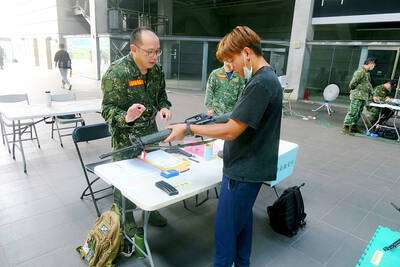Following the passage of the Enforcement Act for School-based Experimental Education (學校型態實驗教育實施條例) into law, the Ministry of Education said higher education would be included in its push to increase the scope of experimental education.
As of the current school year, the nation has 4,841 pupils in 61 experimental educational institutions, including 51 public schools, three private schools and seven “non-school” institutions, Ministry of Education K-12 Education Administration Division head Chiu Chien-kuo (邱乾國) said.
Sixteen of the experimental educational institutions are dedicated to Aborigines, he said.
Experimental education began in Taiwan in 1990, when the Humanistic Education Foundation founded the Forest School.
The 1999 Educational Fundamental Act (教育基本法) serves as the legal basis for the establishment of private schools and the right to use unconventional educational approaches, as well as protecting the right to education. Since then, experimental educational institutions have increased steadily.
In 2014, the ministry proposed three laws on experimental education to expand its scope with the aim of giving families additional educational choices and strengthening the rights of students.
The three acts were the Enforcement Act for Non-school-based Experimental Education Across Levels Below Senior High School (高級中等以下教育階段非學校型態實驗教育實施條例), the Enforcement Act for School-based Experimental Education (學校型態實驗教育實施條例) and the Act Governing the Commissioning of the Operation of Public Elementary and Junior Secondary Schools to the Private Sector (公立國民小學及國民中學委託私人辦理條例).
The recently promulgated Enforcement Act for School-based Experimental Education allows experimental higher-education institutions beyond vocational high schools and colleges.
The law raised the student limit for experimental institutions at the high-school level and below from 480 student per school to 600 students per school.
The public education system also gained more latitude for creating experimental schools.

A magnitude 6.4 earthquake struck off the coast of Hualien County in eastern Taiwan at 7pm yesterday, the Central Weather Administration (CWA) said. The epicenter of the temblor was at sea, about 69.9km south of Hualien County Hall, at a depth of 30.9km, it said. There were no immediate reports of damage resulting from the quake. The earthquake’s intensity, which gauges the actual effect of a temblor, was highest in Taitung County’s Changbin Township (長濱), where it measured 5 on Taiwan’s seven-tier intensity scale. The quake also measured an intensity of 4 in Hualien, Nantou, Chiayi, Yunlin, Changhua and Miaoli counties, as well as

Credit departments of farmers’ and fishers’ associations blocked a total of more than NT$180 million (US$6.01 million) from being lost to scams last year, National Police Agency (NPA) data showed. The Agricultural Finance Agency (AFA) said last week that staff of farmers’ and fishers’ associations’ credit departments are required to implement fraud prevention measures when they serve clients at the counter. They would ask clients about personal financial management activities whenever they suspect there might be a fraud situation, and would immediately report the incident to local authorities, which would send police officers to the site to help, it said. NPA data showed

ENERGY RESILIENCE: Although Alaska is open for investments, Taiwan is sourcing its gas from the Middle East, and the sea routes carry risks, Ho Cheng-hui said US government officials’ high-profile reception of a Taiwanese representative at the Alaska Sustainable Energy Conference indicated the emergence of an Indo-Pacific energy resilience alliance, an academic said. Presidential Office Secretary-General Pan Men-an (潘孟安) attended the conference in Alaska on Thursday last week at the invitation of the US government. Pan visited oil and gas facilities with senior US officials, including US Secretary of the Interior Doug Burgum, US Secretary of Energy Chris Wright, Alaska Governor Mike Dunleavy and US Senator Daniel Sullivan. Pan attending the conference on behalf of President William Lai (賴清德) shows a significant elevation in diplomatic representation,

The Taipei City Reserve Command yesterday initiated its first-ever 14-day recall of some of the city’s civilian service reservists, who are to undergo additional training on top of refresher courses. The command said that it rented sites in Neihu District (內湖), including the Taipei Tennis Center, for the duration of the camp to optimize tactical positioning and accommodate the size of the battalion of reservists. A battalion is made up of four companies of more than 200 reservists each, it said. Aside from shooting drills at a range in New Taipei City’s Linkou District (林口), the remainder of the training would be at